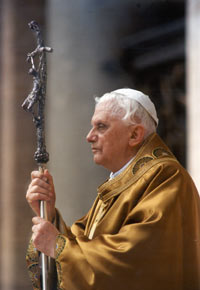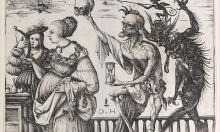Pope's letter to Catholic Chinese to be released on Saturday

A letter by Pope Benedict XVI to Roman Catholics in China will be released on Saturday. The pontiff tries to reach out to Beijing and bring all of China's faithful into the Vatican's fold.
A Vatican statement issued Friday said the pope's letter - addressed to bishops, priests and lay faithful in China - would be released at noon Saturday (1000 GMT).
China forced its Roman Catholics to cut ties with the Vatican in 1951, shortly after the officially atheist Communist Party took power. Worship is allowed only in the government-controlled churches, which recognize the pope as a spiritual leader but appoint their own priests and bishops.
Millions of Chinese, however, belong to unofficial congregations loyal to Rome.
Benedict has been reaching out to Beijing in an effort to restore diplomatic ties and unite China's estimated 12 million faithful. The government and the Vatican have been at loggerheads over the Vatican's insistence on naming bishops.
Benedict's decision to address Chinese Catholics in a letter came out of high-level talks on China at the Vatican in January. The general outlines of the pope's letter could be seen in the Vatican statement following the meeting.
It spoke of its interest in pursuing "respectful and constructive dialogue" with the government while paying tribute to those Catholics who have suffered for their loyalty to the pope.
The Chinese Patriotic Catholic Association has welcomed the Vatican's diplomatic initiative and said earlier this year that the letter from the pope to Chinese Catholics could be helpful.
"I hope and I also believe that the pope's letter will show his love of China's churches," the head of the Patriotic Association, Liu Bainian said in January.
Vatican watchers have said they expect the pope will stress the unity of the Catholic Church in the document, which Italian news reports said would be about 28 pages long and read like a mini-encyclical.
The reaction of the Beijing government and the underground faithful will be vitally important. Some underground priests have already expressed resentment about the pope's outreach to the government and the official church, according to the official bishop of Shanghai, Bishop Aloysius Jin Luxian.
"There will be two different reactions," said Agostino Giovagnoli, a professor of contemporary history at the Catholic University in Milan, who has written about Vatican-China relations.
The underground bishops may resent the pope's recognition of the fact that many "official" bishops who were consecrated without Rome's consent have since reconciled with the Holy See, he said.
"Maybe the reaction of the official bishops will be better," he said.
Benedict made clear from the outset of his papacy two years ago that improving relations with China was a key priority.
He has sent envoys to Beijing to sound out the government on the possibility of restoring ties, and he invited four Chinese bishops - from the official and underground churches - to a meeting of the world's bishops in 2005. Beijing did not let any of the four attend.
Some nominations of bishops have been tacitly agreed upon, but the state-sanctioned Chinese Patriotic Church unilaterally went ahead and appointed three bishops on its own last year, raising Vatican anger.
The Vatican has said it would concede to another key demand of Beijing to downgrade relations with Taiwan in exchange for restoring ties with Beijing.
Subscribe to Pravda.Ru Telegram channel, Facebook, RSS!




